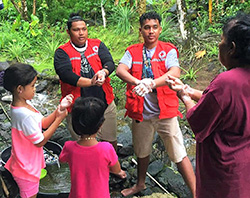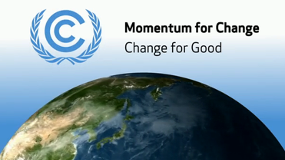Micronesian youths take a step forward in the fight against the global pandemic
- Details
- Category: News
- Published: Monday, 30 November -0001 00:00
- Written by Bill Jaynes
- Hits: 257
Youths take lead in COVID-19 awareness efforts
Zubnah Khan
03 August 2020
 Pohnpei, Federated States of Micronesia– There were three houses up on the hill, with another six to eight houses on another hill from these three houses that needed to be reached. With pouring rain that blanketed a single muddy and slippery path uphill, Micronesia Red Cross Society youth volunteers embarked on their journey to reach locals in remote communities with COVID-19 preparedness information.
Pohnpei, Federated States of Micronesia– There were three houses up on the hill, with another six to eight houses on another hill from these three houses that needed to be reached. With pouring rain that blanketed a single muddy and slippery path uphill, Micronesia Red Cross Society youth volunteers embarked on their journey to reach locals in remote communities with COVID-19 preparedness information.
“We were trying our best not to slip while we walked to reach people living in Kitti. We went back to the station dripping wet and sogged in mud after a whole day of information sharing in this area and about four days to finish the whole community,” says 17-year-old Gorinna Booth.
Even though the global pandemic, COVID-19, has not reached this small Micronesian country, its effects could be felt by more than 100,000 locals, including more than 40,000 children, who reside on the islands. Many people in these remote areas were still not aware of how to prepare for and prevent the spread of this deadly disease.
UNICEF partnered with the Government of the Federated States of Micronesia and the Micronesia Red Cross Society for a house-to-house campaign to engage children and other locals on COVID-19 awareness. A total of 60 youth volunteers were trained on prevention and hygiene promotion for this four-month campaign.
While Gorinna remembered the past couple of months, another youth volunteer highlighted taking a boat to reach a community called Pakin which took two hours from mainland Pohnpei to reach 19 households with about 100 people.
18-year-old Donevaun Esiel, or Donny as he likes to be called, got off the boat to see three communities on the island. There was a mix of traditional and modern huts with many children playing, running around or swimming as schools were closed.
Donny, third from right, demonstrates how to properly wash hands with soap and water to communities, including children, during the campaign.
The people in Pakin have a tradition to rub coconut oil on visitor’s arms and welcome them with coconut drink before they embark the island.
“This was my first time to visit this remote island. It was a sunny, hot day and at first, they did not want to listen to our awareness sessions, some were even nervous to see new faces, but as they learnt new
things, their interest grew and they all gathered in a big traditional hut to hear what we wanted to say,” says Donny.
The locals in Pakin did not have access to a proper water supply and depended on a well which had a mixture of pure and saltwater.
“They did have soap, but it was like a race to finish when they washed their hands. The people were shocked to learn that there was actually a method of properly washing their hands. Our campaign programme supported the households with buckets to assist with their needs of water,” he added.
Gorinna jumped in to add that it was the same in the other communities she visited including Madolenihmw. Some of the residents depended on rainwater and had tanks so they did wash hands, but they just rinsed them and were surprised knowing the steps of washing their hands as well as how important it is for good hygiene and safety.
“When we demonstrated how to wash hands properly, the children were so excited and keen to learn.” She pauses with a laugh. “It was so much fun washing our hands with them. They were very fast learners and enjoyed the session.”
During the campaign, more than 20,000 people with about 8,000 children from more than 3,000 households in Pohnpei alone were engaged with and sensitized on COVID-19 prevention and hygiene practices.
The youth volunteers used materials such as flipcharts and flyers to conduct one-on-one discussions as well as practical demonstrations on basic hygienic practices with the locals. Village members actively participated in the sensitization sessions which will foster community ownership and sustain adoption of safe hygiene practices.
In addition to community engagement, the youth volunteers were also trained on data collection with a mobile application to assist the government with important information for COVID-19 preparedness and response planning.
“We used mobile phones to record information such as how many people were living in one house, how many children and sick people as well as how many were suffering from non-communicable diseases,” says Gorinna.
For Gorinna and Donny, this was an experience they will never forget and are looking forward to being part of yet another journey to help their small island nation in the fight against COVID-19.
The campaign had been funded by USAID for COVID-19 response activities in FSM.






